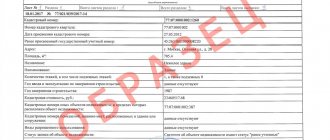State registration of a previously arisen right - a desire of the copyright holder or a necessity?
Owners of real estate often have a question about whether it is necessary to register previously acquired rights to real estate. People ask: “Are old documents valid or do they need to be changed and new ones obtained?”
The procedure for state cadastral registration and state registration of rights is regulated by Federal Law No. 218-FZ of July 13, 2015 “On State Registration of Real Estate” (hereinafter referred to as the Registration Law). In the event that the title document for a real estate property owned by a citizen was drawn up before the entry into force of the Federal Law of July 21, 1997 No. 122-FZ “On state registration of rights to real estate and transactions with it” (in the territory of the Kaliningrad region - before 05.08. 1999), the right of ownership of such an object in accordance with the provisions of the current legislation is recognized as having previously arisen. Please note that such rights are recognized as having previously arisen, provided that the documents evidencing them are drawn up in accordance with the requirements of the legislation in force at the time of their issuance. Until 08/05/1999, in the Kaliningrad region, rights to real estate were registered by various organizations, such as technical inventory bodies (BTI), local government bodies: land committees, executive committees of the district, city Council of People's Deputies and others. The procedure for recognizing previously arisen rights of citizens to real estate is determined by Art. 69 of the Registration Law. Thus, according to this article, previously arisen rights are recognized as legally valid even in the absence of their state registration in the Unified State Register of Real Estate. State registration of such rights and making relevant entries in the Unified State Register of Real Estate is carried out exclusively at the request of their owners. Thus, the current legislation does not provide for a mandatory requirement for state registration of a previously arisen right. We draw the attention of copyright holders to the need to pay a state fee for state registration of a previously arisen right in the following cases. The amount of state duty for state registration of rights, transactions and restrictions in relation to real estate objects is established by the provisions of the Tax Code of the Russian Federation. If the right holder has applied for state registration of a previously arisen right without simultaneous registration of the transfer of this right, an alienation transaction (donation, sale, etc.) or a restriction (encumbrance) of the right, the amount of the state fee will be 2,000 rubles (clause 22 Article 333.33 of the Tax Code of the Russian Federation). When state registration of a previously arisen right with the simultaneous transfer of the right to a property based on, for example, a purchase and sale agreement, no state duty is charged.
196
State registration of previously arisen property rights
The procedure for state cadastral registration and state registration of rights is regulated by Federal Law No. 218-FZ of July 13, 2015 “On State Registration of Real Estate” (hereinafter referred to as the Registration Law).
If the title document for a real estate object owned by a citizen was drawn up before the entry into force of Federal Law No. 122-FZ of July 21, 1997 “On State Registration of Rights to Real Estate and Transactions with It,” the ownership of such an object is in accordance with the provisions of the current legislation is recognized as having previously arisen. Please note that such rights are recognized as having previously arisen, provided that the documents evidencing them are drawn up in accordance with the requirements of the legislation in force at the time of their issuance.
Until 08/05/1999, in the Kaliningrad region, rights to real estate were registered by various organizations, such as technical inventory bodies (BTI), local government bodies: land committees, executive committees of the district, city Council of People's Deputies and others.
The procedure for recognizing previously arisen rights of citizens to real estate is determined by Art. 69 of the Registration Law. Thus, according to this article, previously arisen rights are recognized as legally valid even in the absence of their state registration in the Unified State Register of Real Estate. State registration of such rights and making relevant entries in the Unified State Register of Real Estate is carried out exclusively at the request of their owners.
Thus, the current legislation does not provide for a mandatory requirement for state registration of a previously arisen right.
We draw the attention of copyright holders to the need to pay a state fee for state registration of a previously arisen right in the following cases. The amount of state duty for state registration of rights, transactions and restrictions in relation to real estate objects is established by the provisions of the Tax Code of the Russian Federation.
If the right holder has applied for state registration of a previously arisen right without simultaneous registration of the transfer of this right, an alienation transaction (donation, sale, etc.) or a restriction (encumbrance) of the right, the amount of the state fee will be 2,000 rubles (clause 22 Article 333.33 of the Tax Code of the Russian Federation).
When state registration of a previously arisen right with the simultaneous transfer of the right to a property based on, for example, a purchase and sale agreement, no state duty is charged.
Chernyakhovsky Department of the Rosreestr Office for the Kaliningrad Region
Why do you need to register a previously arisen right?
So, thanks to the presence of title documents or with the help of an extract from the Unified State Register of Real Estate, you are convinced that the property you are interested in has previously arisen rights. What to do next?
As we said earlier, these rights are legally significant. Therefore, no one obliges their owner to apply for their registration with Rosreestr. However, we strongly recommend that owners do so.
Let's explain why.
- Firstly, when concluding almost any real estate transaction (purchase and sale, gift, exchange, pledge, lifelong maintenance with dependents, rent), the presence of a registered right is proof of your competence for the second party to the contract.
- Secondly, when registering a transaction, state registration of a previously arisen right will still be required - it is carried out simultaneously with the registration of the transfer of ownership. And at the same time, a situation often arises when errors are discovered in old title or title documents, which does not allow the state registrar to carry out registration actions. In simple terms, until the discrepancies in the documents are eliminated, the transaction cannot be completed!
- Thirdly (and this is very important!), without registering a previously arisen right with the Unified State Register of Real Estate, you cannot protect your property from fraudsters by recording the impossibility of making transactions without the personal participation of the property owner.
If you, as a property owner, are convinced of the need to confirm a previously arisen right in Rosreestr, follow our further instructions.
What is a “previously existing right to real estate”?
First, a little theory.
State registration of rights to real estate in its modern form began to be carried out from the moment when Federal Law No. 122-FZ of July 21, 1997 “On state registration of rights to real estate and transactions with it” came into force. In accordance with it, the Registration Service was created, which began to enter information about all emerging rights to real estate in the state register of rights.
However, rights to real estate objects arose even before the creation of the registration service and register of rights. They are recognized as having previously arisen if the title documents for them are drawn up in accordance with the procedure in force at the time of their occurrence.
What are these documents?
If we are talking about rights to a land plot, then these could be, for example:
- certificate of ownership, right of lifelong inheritable possession, permanent (perpetual) use of land, issued in accordance with Decree of the Government of the Russian Federation dated March 19, 1992 No. 177 “On approval of forms of certificate of ownership of land, lease agreement for agricultural land and agreement temporary use of agricultural land";
- a state act certifying the ownership of land, lifelong inheritable possession, perpetual (permanent) use of land of citizens, enterprises, institutions, organizations or peasant (farm) households, drawn up in accordance with Resolution of the Council of Ministers of the RSFSR dated September 17, 1991 No. 493 “On approval forms of state act on the right of ownership of land, lifelong inheritable possession, perpetual (permanent) use of land”;
- certificate of ownership of land, issued in accordance with Decree of the President of the Russian Federation dated October 27, 1993 No. 1767 “On the regulation of land relations and the development of agrarian reform in Russia”;
- a document containing a decision to provide a land plot with a certain right to a specific person, issued by an authorized body (organization) in the manner established by the legislation in force at the place of publication of such a document at the time of its publication;
- an extract from the household register, drawn up in accordance with the order of Rosreestr dated 03/07/2012 No. P/103 “On approval of the form of an extract from the household register on the citizen’s right to a land plot”;
- lease agreement for a land plot, the term of which has not expired at the time of application to Rosreestr, etc.
These documents must be issued by the appropriate authority (usually local administrations or land committees).
If we are talking about rights to a house, apartment or other capital construction project, then the rights to such objects should have been registered by the body carrying out registration for that period of time (as a rule, this is the technical inventory body - BTI).
If the rights to an apartment, residential building, land plot or other real estate were acquired before January 31, 1998 and arose on the basis of one of the listed documents, then they are considered legally valid.
State registration of such rights in the Unified State Register of Real Estate (USRN) is carried out either at the request of their owners, or when registering real estate transactions.
But what if you don’t have any title or title documents on hand?
We hasten to reassure you: not everything is so hopeless. Theoretically, the USRN may contain information about previously arisen rights.
How can I find out about previously acquired rights?
A peculiarity of previously arisen rights to real estate is that today there is no information about them in the Unified State Register of Real Estate, while information about the object itself was previously transferred from the technical accounting authorities and entered into the State Real Estate Cadastre (GKN).
Due to the fact that since 2021, information from the State Property Committee, along with information from the Unified State Register of Rights (USR), is included in the Unified State Register of Rights, today there is a real opportunity to find out about the existence of such rights.
To do this, it is enough to request from Rosreestr an extract from the Unified State Register of Real Estate about the property.
So, if the Unified State Register contains information about previously arisen rights, then in the column “Special notes” of Section 1 of the extract from the Unified State Register about the property it is indicated:
- type of right and size of share in the right;
- last name, first name, patronymic (if any) of the individual copyright holder or full name of the legal entity copyright holder;
- details of the documents (if any) on the basis of which the relevant information was entered.
Accordingly, if this information is not indicated in the “Special Notes” column, this means that there is no information about previously arisen rights in the Unified State Register of Real Estate.
And this is a completely different story...
You can obtain an extract from the Unified State Register of Real Estate about a property, regardless of its location, in several ways:
- by personally contacting any MFC office;
- by using the on-site reception service provided by the Cadastral Chamber;
- by mail;
- through electronic services on .





